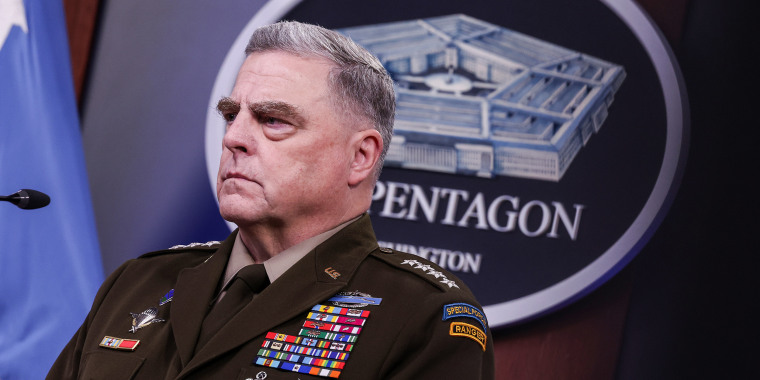Should they take control of the House in November, Republicans plan to launch a congressional investigation of the chairman of the Joint Chiefs of Staff — the nation's highest-ranking military officer. Sources told NBC News that Republicans would plan to grill Gen. Mark Milley over “criticism that the military has become too ‘woke’” during his tenure, among other things.
It’s a clear sign that the increasingly MAGA-infused GOP is keen on waging a war against Milley and painting him as a villain for inappropriately politicizing the military. But the irony of this enterprise is that Milley’s most overtly political behavior has been a response to former President Donald Trump’s instability, authoritarianism and attempts to politicize the military. When his hand was forced, he appropriately chose the track of defending the nation against anti-democratic extremism instead of being deferential to it.
All of it is part of a broader program to try to force the military to yield to MAGA politics.
In addition to the “woke” allegation, any Republican investigation would presumably try to publicly hammer Milley over the many reports of his comments and alleged behind-the-scenes maneuvering to prevent Trump from doing something extreme before he left office. All of it is part of a broader program to try to force the military to yield to MAGA politics.
Milley’s supposed wokeness agenda is an absurd point of criticism for many reasons. The MAGA right was furious when Milley defended the concept of using “critical race theory” during a defense budget hearing last year.
One must ask: Why was Milley even being asked about critical race theory in the first place? It was because Republicans bizarrely insisted on asking him why the academic framework of critical race theory — which studies how racism is embedded in American institutions — was included in curricula at the U.S. Military Academy. Milley emphatically defended its inclusion on the basis that the U.S. Military Academy is a university and said that “it’s important for those of us in uniform to be open-minded and be widely read.”
The key point to remember here is that a right-wing activist openly admitted to inventing a crisis around critical race theory — a mode of academic thought that dates back to the 80s — in order to advance the MAGA agenda. It was not controversial, or even known to exist by most people, until it got tossed into the Trumpian white nationalist propaganda machine. And the only reason it was brought up in a defense budget hearing was to try to advance that propagandistic mission and undermine Milley’s reputation, since he was considered a part of the anti-Trump “resistance” in Washington.
But instead of choosing to back off the challenge, Milley decided to stand up against it. He didn’t want to concede to the MAGA movement’s attempts to politicize routine academic affairs, or to concede the white nationalist talking point that studying racism was somehow a form of racism itself.
The other major GOP line of inquiry would likely be Milley’s reported comments and actions that sought to act as a check on Trump’s power. This is a more complex issue, because the precedent of the military bucking civilian control in ways that diverge from norms and rules is something worthy of public scrutiny and could indeed set a dangerous precedent.
First, let’s be clear: the MAGA hype about Milley being “treasonous” in his behavior is unconvincing and based on pure exaggeration. Risa Brooks, a political scientist at Marquette University, told me that Milley’s big personality and fiery quotes — Milley told aides that he believed Trump spread "the gospel of the Führer" in his attempts to overturn the election — tend to distract from the reality that there’s no evidence that any of his actions actually transgressed civil-military norms. “We don’t know of anything at this point in time that he did that constituted a clear obstruction of civilian control,” Brooks told me.
For example, reports that Milley spoke to his Chinese counterpart twice in the final months of Trump's presidency to assure Beijing that the U.S. was stable and that Trump was not going to attack China generated controversy. But his actions were taken through the standard channels, coordinated with the secretary of defense, and in line with Trump’s policy vision (Trump did not want to attack China). The reason Milley spoke to his counterpart was because of intelligence indicating that the Chinese were concerned by Trump’s unpredictability as his presidency came to an end. Trump, unsurprisingly, still decided to say Milley should be tried for treason over it.
Still, it cannot be denied that Milley did engage in some more overtly political behavior with some of his remarks to colleagues about Trump. And even if there isn’t evidence he violated protocols, he clearly tried to signal that he was an ally in favor of democracy through his reported participation in “land the plane” phone calls with officials in the Trump administration that sought to ensure a peaceful transfer of power.
Again, it must be asked: Why did Milley feel compelled to do this? The answer: Trump’s assault on the democratic process, whether through disinformation, or obstructing a certification of Biden’s presidential victory, or calling for the military to violently repress protests. There is no evidence that Milley was actively seeking to make the military a part of the political process — until he felt it might be necessary to protect the rule of law and the legitimacy of the most basic tenets of democracy. This was unquestionably better than the alternative of a blind obedience to presidential power without regard for laws, truth and bedrock democratic principles.
Given what we know about how top military officers and defense officials tend to think about Trump, any Republican investigation against Milley will likely only make them even more vigilant about the specter of tyranny and the role of the military in guarding against it.

